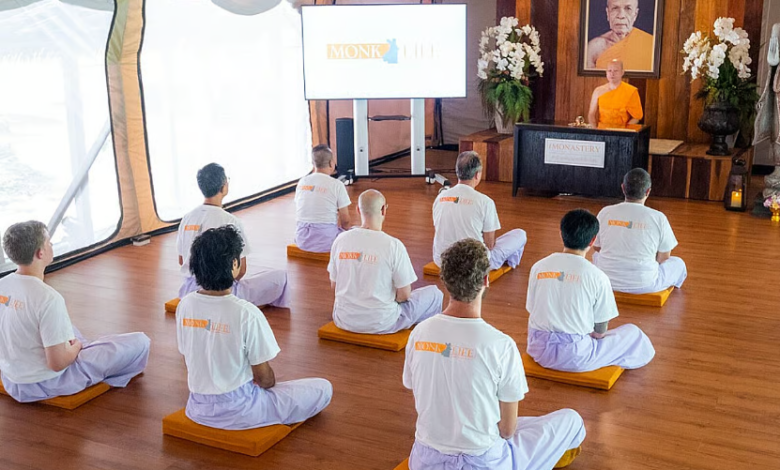Malaysia Meditation Retreat: Buddhist Healing for Body And Mind

Experience a path where healing begins from within. Surrounded by calm nature and supported by ancient wisdom, you can release stress, restore energy, and reconnect with a sense of wholeness. A Malaysia meditation retreat focused on Buddhist healing offers a powerful blend of mindfulness, compassion, and inner stillness to support both body and mind. Through guided meditation, breathing techniques, and gentle practices, these retreats help clear emotional blockages and promote deep well-being on every level.
What Is Buddhist Healing?
Buddhist healing is about changing the way we think and feel, not just treating physical issues. Suffering comes from craving, anger, and ignorance. Healing begins by letting go of harmful habits.
Key Ideas in Buddhist Healing
1. Everything Changes (Impermanence / Anicca)
Accepting that everything changes helps us suffer less and face pain with calm.
2. Everything is Connected (Dependent Origination / Paṭicca-samuppāda)
Our health doesn’t come from one cause but from many. Physical and mental health are linked to how we think, act, and live in our environment.
3. Mental Qualities That Heal
In early Buddhism, these seven qualities were valued as essential for healing and deep inner transformation. These include:
- Mindfulness.
- Clear Understanding
- Joy
- Concentration
- Calmer
These teachings not only guide spiritual growth but also help ease the body and mind.
See also: Understanding the Impact of Viagra on Men’s Health Beyond ED
What Is the Atmosphere Like at a Buddhist Meditation Retreat?
Buddhist retreats are carefully designed to support deep meditation and inner transformation by creating a quiet, focused setting.
1. Peaceful, Natural Settings
Retreats in quiet natural places help reduce distractions, support relaxation, and encourage mindfulness.
2. Silence: Noble Quiet
Retreats often observe noble silence, where speech is limited to essentials, helping calm the mind, deepen self-awareness, and foster inner stillness through quiet.
3. Clear, Supportive Schedule
Days on retreat are carefully structured. A typical day includes:
- Sitting meditation.
- Walking meditation.
- Chores done mindfully (like cooking or cleaning).
- Dharma talks (teachings from the Buddha).
- Personal interviews with teachers.
This balance between practice, rest, and simple work keeps your focus steady and your energy grounded.
4. Simple Living
Buddhist retreats offer a simple lifestyle that reduces distractions and promotes contentment.
5. Spiritual Energy & Community
Even in silence, there’s a shared energy: everyone is practicing together with the same goal of mindfulness and peace. The retreat space often includes:
- Meditation halls or shrine rooms.
- Gardens or stupas (Buddhist monuments).
- Buddhist art or symbols.
This creates a gentle spiritual feeling that supports your practice without being overwhelming.
6. Why the Atmosphere Matters
The retreat environment is carefully created to help you:
- Let go of daily worries.
- Focus on the present moment.
- Develop mental clarity and insight.
It’s like stepping into a peaceful bubble where healing, growth, and deep understanding become possible.
Buddhist retreats offer peaceful spaces to disconnect from daily noise, slow down, and reconnect with what truly matters.
What to Expect at a Buddhist Meditation Retreat
Buddhist retreats help deepen mindfulness, compassion, and spiritual understanding through structured, peaceful practices.
1. Core Meditation Practices
- Vipassanā (Insight Meditation) – Observing breath/body to understand impermanence and selflessness.
- Samatha (Calm Abiding) – Builds concentration and inner peace.
- Metta Bhavana – Loving-kindness practice to grow compassion for self and others.
- Zazen (Zen Sitting) – Silent sitting with present-moment awareness, sometimes reflecting on koans.
- Tonglen – Tibetan meditation on compassion: breathing in others’ pain, breathing out healing.
2. Mindful Movement & Daily Activities
- Walking Meditation – Moving slowly with awareness of each step and breath.
- Work Meditation – Doing tasks like cleaning or cooking with full presence.
3. Teachings & Support
- Dharma Talks – Daily teachings on meditation and Buddhist wisdom.
- Teacher Interviews – One-on-one or group guidance from experienced teachers.
- Chanting & Rituals – May include bowing, mantras, or devotional practices.
4. A Typical Retreat Day
- Early morning meditation.
- Alternating walking and sitting practice.
- Silent vegetarian meals.
- Light mindful chores.
- Evening teachings or reflections.
- Rest and silence.
Buddhist retreats offer a peaceful space for personal growth and mindful living.
Long-Term Benefits of Buddhist Meditation Retreats
Buddhist retreats, like Vipassana, can bring lasting benefits to mind, body, and daily life when practice continues beyond the retreat.
1. Mind & Mental Health
- Lasting Focus & Clarity: Regular meditation helps maintain a clear and focused mind, supporting mental sharpness as you age.
- Better Emotional Balance: Many people feel calmer, less reactive, and more positive even years after.
- More Mental Energy: Meditators often report feeling mentally lighter, with less stress and fatigue.
2. Physical & Brain Health
- Beyond Relaxation: Retreats offer deeper health benefits than vacations by improving gene activity, reducing inflammation, and boosting the immune system.
- Improved Sleep: Many people experience deeper and longer sleep for weeks or even months after a retreat.
- Brain Changes: Meditation boosts focus, memory, and emotional control in just a few weeks.
3. Lifestyle & Growth
- Life Improvements: Regular meditation can lead to better health, clearer thinking, and reduced need for medication.
- Simpler, Healthier Living: Retreats often inspire a more mindful, calm, and balanced way of living.
4. Possible Post-Retreat Challenges
- Emotional Sensitivity: It’s normal to feel raw or overwhelmed after a retreat. Gentle practice and supportive guidance can help ease these feelings.
- Lingering Body Sensations: Some experience tingling or energy shifts. These usually pass with time and guidance.
- “Retreat Blues”: “Retreat blues” is a common dip in motivation or mood after a retreat, as your mind adjusts and processes the profound experiences you went through.
How to Keep the Benefits Going
To maintain the peace and clarity gained from a meditation retreat, it’s important to carry the practice into your daily life. Here’s how:
- Meditate Daily: Even just 10 minutes of mindfulness or breath awareness each day can keep your mind steady and your heart open.
- Create a Routine: Set a regular time and space for meditation. Consistency helps build inner strength and stability.
- Join a Group or Find a Teacher: Meditating with others or getting guidance from an experienced teacher can keep you inspired and supported.
- Read or Listen to Dharma Teachings: Staying connected to Buddhist teachings helps deepen understanding and reminds you of your path.
- Be Gentle with Yourself: After a retreat, emotions may feel more intense. Allow them to come and go without judgment.
- Practice Mindfulness in Daily Life: Be present while eating, walking, or doing chores. These small acts of awareness keep the retreat spirit alive.
- Stay Connected: If you feel overwhelmed or confused, reach out to your retreat center, teacher, or meditation community for support.
- Reflect Often: Journaling or quiet reflection can help you stay in tune with your growth and keep your intentions clear.
Buddhist meditation retreats support growth in mind, body, heart, and spirit.
Conclusion: Finding Healing and Balance
A meditation retreat in Malaysia offers more than just rest, it helps you grow and heal from the inside out. Mindfulness and Buddhist wisdom in a peaceful setting help reduce stress, deepen self-awareness, and restore balance. Whether you want peace of mind, personal insight, or a fresh start, a Buddhist retreat in Malaysia is a gentle way to slow down and find balance in your body, mind, and spirit.



